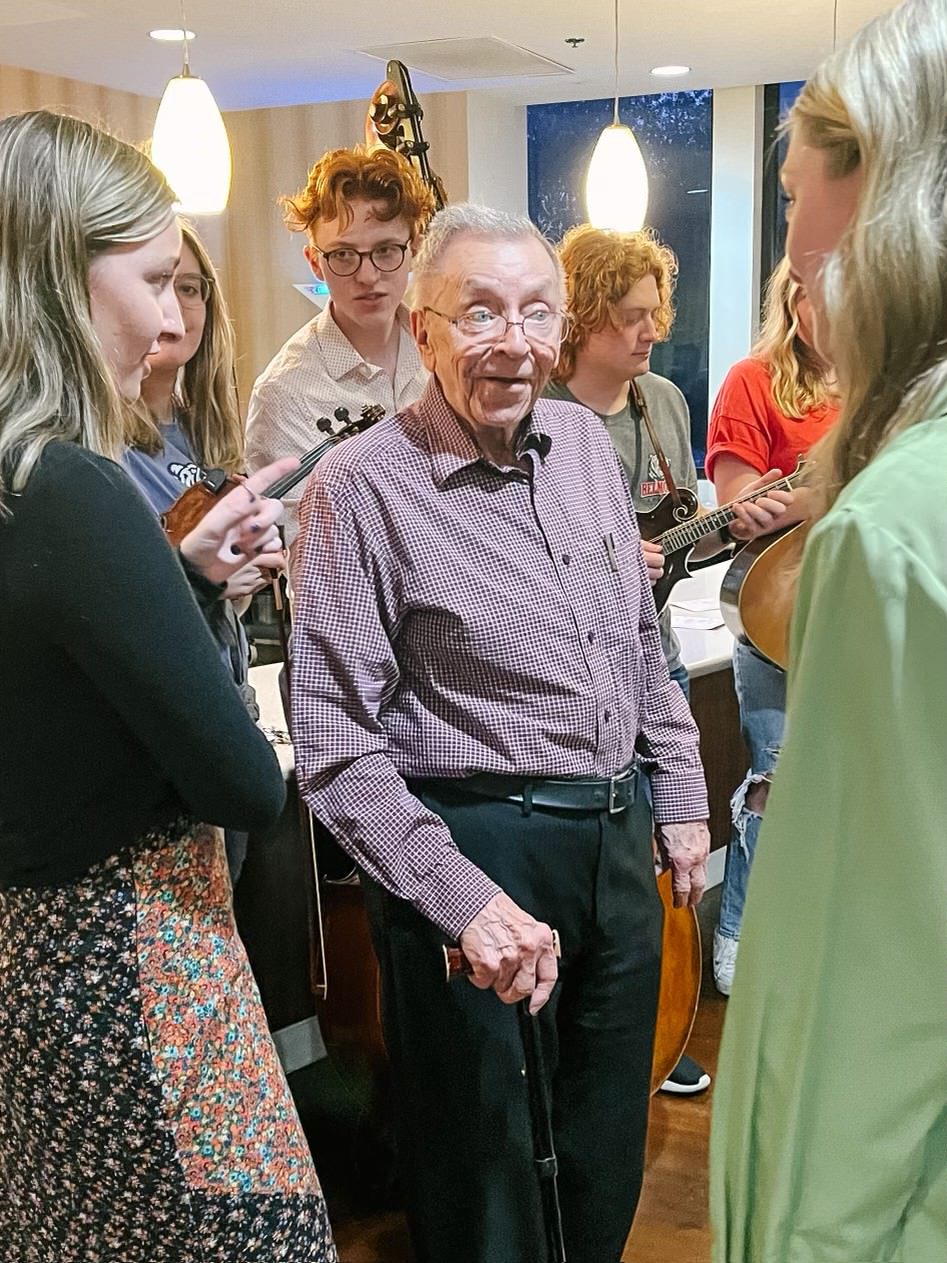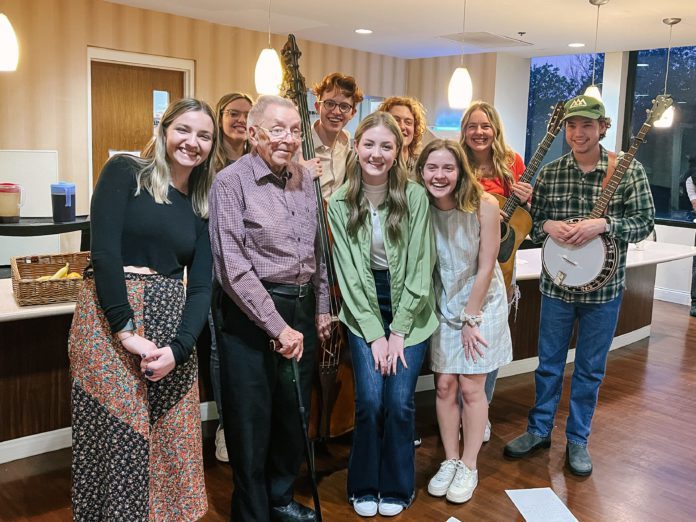Each Monday and Wednesday morning, students from Belmont’s Music Therapy program walk to Morningside of Belmont—a retirement community just steps away from the Wilson Music Building—for music therapy sessions with residents.
Music therapy can most easily be described as “music as science,” and uses music as a clinical intervention to work towards non-musical goals. With versatile application, music therapy can address everything from managing pain to enhancing communication, increasing motivation, self-regulation, maintaining independence and more.
Recently, staff noticed a decline in attendance at Morningside’s music therapy sessions from residents with higher cognitive levels. “Our sessions were geared toward the lower end of cognition, which makes sense because we want everyone to be successful,” said Channing Shippen, Belmont music therapy instructor and clinical coordinator. “Some people need a bit more complexity to be fully engaged, so we created two separate groups.”
The Monday group applies music therapy in a traditional sense with movement-based activities and singalongs to get residents active and stimulated by the music. The Wednesday group focuses on songwriting and gives space for participants to tell their own stories. As a new faculty member, Shippen was inspired by Belmont’s strategic pathways at faculty orientation—particularly storytelling—and how the craft can daily intersect with her work in music therapy.
Between 10 and 15 residents participate in the weekly songwriting group, which highlights a different songwriter each session. Their time starts by listening to and singing songs by the featured artist that week to get the residents reminiscing about their experiences with the songwriter before moving into a group discussion.
During a time when residents share personal stories and experiences, music therapy student facilitators pull keywords and phrases from conversation and write a few verses during their discussion. Sung over an extemporaneous melody, the group has co-written an original song by the end of each session.
“We had a few residents who expressed more interest in songwriting, looking to explore it personally and more deeply, but who didn’t have an outlet to do so,” said Shippen. “Joe was one of those.”
A lifelong Middle Tennessean, Morningside resident Joe has seen Nashville transform from a sleepy suburban town to a thriving metropolis throughout his life. The therapeutic intent of Joe’s songwriting sessions was to dialogue about his 94-year relationship with this city, from him living here and observing all the changes. Each week, Joe and the students would dive into a different subject, from landmarks to universities to feelings.
Throughout seven months, Joe penned the song “It’s Not Out in the Country Anymore,” a 16-verse nod to his hometown. A retired lawyer, Joe even made sure to copyright his lyrics.
“He would come back each week with a new verse, eager for feedback,” said Shippen. “It was very collaborative, but it’s really his words. With music therapy, Joe—in a sense—had a musical goal, but that wasn’t the heart of our sessions. It was about providing an opportunity for him to feel listened to and to self-express, to challenge him cognitively and offer space for discourse and elevated conversation.”
Through Joe’s direction, the song was eventually put to music where he guided sound and notation. His dream to hear it by a live band was realized when Belmont’s Bluegrass Ensemble came to Morningside to perform the song for Joe and other residents. Described as incredibly witty and enthusiastic with a great sense of humor, Joe cares deeply and takes into consideration those around him. Shippen said he didn’t tell the other residents he wrote a song, likely because he didn’t want the accolades focused on him; he wanted the students to receive those.

Performed by a guitar, a bass, a fiddle, a banjo and three singers, Joe beamed as the Ensemble brought his song to life. “This is spectacular, and it couldn’t have been better.” he said. “This has been a real inspiration and something I planned to do my entire life and it’s finally come to fruition.”
The weekly songwriting group will likely continue for the foreseeable future, but Shippen stressed the importance of continually checking in with the people music therapists are serving. She teaches her students to ask questions often such as ‘Do my clients feel growth?’ or ‘Is this beneficial for them?’ She hopes to collaborate with more ensembles within the School of Music to bring songwriters’ songs to life in a full way, just as the Bluegrass Ensemble did with Joe.
How does one become a music therapist?
Shippen describes music therapy as one of the most complex degrees within the School of Music due to its interdisciplinary nature. Students take courses in the sciences—such as biology, anatomy and physiology, and psychology—in addition to general music courses, before diving into music therapy-specific courses. Before receiving their degree, students complete a 180-hour field experience (such as Morningside at Belmont), a 1200-hour internship and a 3-hour board certification exam.
“Further licensure depends on the state,” said Shippen. Currently in Tennessee, there is a bill in the House Health Committee that, if signed into law, will require music therapists to be licensed to practice in Tennessee. Dr. Alejandra Ferrer, assistant professor of music recently testified before the House Health Subcommittee lobbying for the bill’s passage.
Music therapists must be credentialed, but because they are not licensed in every state, credentials are not always recognized. If the Tennessee General Assembly passes the bill, required licensure would provide added job protection, and would aid in legality and insurance reimbursement. “Participation in music therapy is often based on privileges and an out-of-pocket expense,” Shippen said. “Being able to bill for insurance would increase our access for people who are really deserving.”
Find out more information on Belmont’s music therapy program by visiting www.belmont.edu/music.



